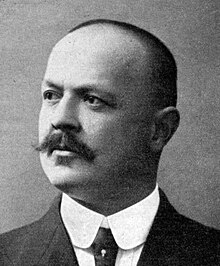Joseph Chuard
Joseph Chuard (born May 20, 1870 in Cugy FR , Broye district , † February 8, 1935 in Zurich ) was a Swiss politician and State Councilor of the canton of Friborg .
Live and act
He was Catholic and from Cugy. His parents were Alphonse Chuard, farmer, and Marie Louise b. Berchier. He married Maria Agathe Ducotterd.
After Joseph Chuard had attended the Hauterive teacher training college for two years (1884–1886), he moved to the technical department of the St. Michael College (1887–1890). He then studied at the Swiss Federal Institute of Technology in Zurich , where he obtained his civil engineering degree in 1894 and then worked as an assistant. He had a successful career in the Swiss, French and German private sector and acquired engineering and administrative skills in several railway and construction companies. In Frankfurt he founded and headed the flourishing Frankfurter Betonbaugesellschaft for 14 years, one of the first companies to specialize in the use of reinforced concrete .
In 1912 he returned to Freiburg , as he was appointed general inspector for civil engineering . He took office on April 1, 1913. From the end of 1913 he also headed the industrial operations of the canton of Friborg . However, he was unable to exercise his offices for long, as he was elected to the State Council in 1914 to succeed his boss Louis Cardinaux, who had suddenly died .
Chuard's choice fell during the turbulent time of the power struggle between Georges Python and Jean-Marie Musy . Initially supported by Python, but then dropped in favor of the Freiburg mayor Ernest de Weck , Chuard still remained a candidate. In the election on May 30, 1914, Chuard and Weck received an equal number of votes. Since Chuard did not have a majority of the conservative votes, but could count on the support of the Liberals, he received 55 out of 107 votes in the second ballot. The election testified to the conservatives' disagreement and confirmed Musy's rise in power within the State Council.
Chuard had the difficult job of running the building department during the war years and at a time when the state finances were in poor shape. In this environment he promoted the renewal of the cantonal roads damaged by the increase in automobile traffic and promoted the Pérolles and Zähringer Bridge projects , which were implemented under his successor Victor Buchs . Since he was aware of the importance of the hydropower plants for the canton and the weak yields of the existing systems, he campaigned for the establishment of the Freiburgische Elektrizitätswerke (FEW) in 1915 and for the construction of the Montsalvens dam in 1918. In the same year he was President of the State Council.
Due to his office and his knowledge, he became a member of numerous boards of directors, boards of directors or commissions in the transport and energy sector at the cantonal (FEW, Freiburg – Murten – Ins railway company, etc.) and Swiss (Federal Commission for Electrical Systems, SBB , etc.). He was also a member of the supervisory board of the technical center and of the ETH board, of which he became vice-president in 1927. In 1915 he took a seat on the Grand Council as a representative of the Saane district .
On June 30, 1919, Chuard resigned as State Councilor and Grand Councilor, as he was appointed to the management of the Elektrobank in Zurich, an important institute that financed electrical operations in Europe and the United States. He died on February 8, 1935 in Zurich when they wanted to appoint him general director of the bank.
literature
- Georges Andrey , John Clerc, Jean-Pierre Dorand et Nicolas Gex: The Freiburg Council of State: 1848–2011. History, organization, members . Editions La Sarine, Freiburg 2012, ISBN 978-2-88355-153-4 .
| personal data | |
|---|---|
| SURNAME | Chuard, Joseph |
| BRIEF DESCRIPTION | Swiss politician and State Councilor for the Canton of Friborg |
| DATE OF BIRTH | May 20, 1870 |
| PLACE OF BIRTH | Cugy FR , Broye district |
| DATE OF DEATH | February 8, 1935 |
| Place of death | Zurich |
